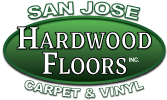Are you familiar with the methods used to create floors? Last week we covered how solid hardwood is made, but what about engineered wood flooring? Here’s a basic overview of the process:
As we’ve explained before, engineered hardwood is comprised of finished wood and less expensive, stronger wood layers pressed together, with the grains running in different directions. So the construction involves gluing various wood plies, or plywood (also referred to as core board), with a veneer of real hardwood on top.
To make sure the engineered hardwood flooring is strong, the core board is created by stacking pieces of plywood together in opposite directions before gluing them together. This process actually makes them more stable than solid hardwood, so they can withstand moisture, humidity and temperature changes without as much expansion and contraction.
Curious about the differences in price? Some engineered wood floors are more expensive because core boards can also be made with high density fiberboard (HDF) which is even more dimensionally stable than the plywood variety (although it costs more to make due to using more expensive materials).
Thickness of the top veneer, ranges from 0.6mm to 6mm; the thicker it is, the higher quality of the engineered flooring (and the higher the price). As you select the thickness, make sure you get veneer that is at least 2mm thick if you plan on sanding and refinishing at any point.
Another reason for price difference has to do with the real hardwood veneer on the top of the flooring. The cutting method also impacts the overall cost:
-
- Dry solid-sawn is the most expensive type. The wood is slowly dried out with a low humidity level so the moisture inside the wood cells remain, which reduces the risk of cupping. This is the variety that looks and acts most like a solid hardwood floor.
Pros: Looks the most like solid hardwood and has the strongest grain structure.
Cons: It’s the most expensive to make and produces the lowest amount of wood veneer.
-
- Rotary-peel can have issues with cupping and warping. After being boiled, it’s created by scraping the wood from the outside of a log to the inside.
Pros: Is the most affordable and produces the highest amount of wood veneer.
Cons: Looks the least like solid hardwood and the weakest structure.
-
- Sliced-peel also comes from a boiled log, but is sliced from the end instead.
Pros: Produces a better amount of wood veneer than dry solid-sawn and is a medium cost. It also looks more like solid wood and is stronger structurally than rotary-peel.
Cons: It doesn’t look as much like solid hardwood as dry solid-sawn and is more expensive than rotary-peel.
An additional construction element to be aware of include the quality of the glue used to hold the layers together. Cheaper ones generally emit more VOCs (specifically formaldehyde), so look for those that are E1 or E0 class or CARB-compliant.
Want to know more? Contact our experts to find out which type of engineered hardwood flooring would be best for your home, lifestyle and budget!
Photo courtesy of Colonial Craft
